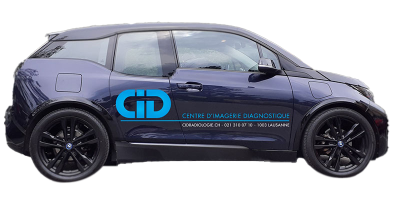Cardiovascular imaging
Prevention and protection: precise imaging for a healthy heart.
Presentation of the cluster
Types of exams offered
Cardiac MRI
Cardiac MRI is an advanced imaging examination that uses a powerful magnetic field and radio waves to obtain detailed images of the heart and surrounding structures. This examination allows for a precise evaluation of the heart muscle, valves, and coronary vessels, and is essential for diagnosing complex heart conditions, assessing the after-effects of a heart attack, or planning surgical interventions
Duration: approximately 30 to 60 minutes. Non-invasive, sometimes involving the injection of a contrast agent.
Indications: evaluation of heart disease, post-infarction monitoring, diagnosis of cardiomyopathies, treatment or intervention planning. Inform the technician of any allergies to the contrast agent before the examination.

High-resolution cardiac coronary CT angiography
coronary CT angiography is a precise imaging examination that uses X-ray scanners to obtain detailed images of the coronary arteries. This technique allows for meticulous visualization of the coronary arteries and is used to diagnose coronary artery disease, plan interventions, and assess the condition of stents or coronary artery bypass grafts.
Duration: approximately 15 to 30 minutes. Slightly invasive due to the injection of contrast agent.
Indications: diagnosis of coronary artery disease, evaluation of coronary stenoses, monitoring of coronary interventions. Inform the technician of any allergies to the contrast agent before the examination.

Cardiac and coronary multiphase CT
Multiphase cardiac and coronary CT is an imaging technique that uses X-ray scanners to obtain multiphase images of the heart and coronary vessels. This method allows for detailed visualization of the coronary arteries and cardiac structures and can help evaluate coronary artery disease or heart abnormalities.
Duration: approximately 10 to 30 minutes. Slightly invasive due to the injection of contrast agent.
Indications: evaluation of coronary artery disease, detection of coronary stenoses, planning of cardiac treatments or interventions. Inform the technician of any allergies to the contrast agent before the examination.

vascular CT gated
Gated vascular CT uses X-ray scanners and cardiac cycle synchronization to obtain precise images of blood vessels. This examination allows for a detailed evaluation of arteries and veins, minimizing artifacts due to cardiac motion, and is essential for diagnosing vascular diseases and planning interventions
Duration: approximately 10 to 30 minutes. Slightly invasive due to the injection of contrast agent.
Indications: evaluation of vascular abnormalities, diagnosis of blood vessel pathologies, post-intervention monitoring. Inform the technician of any allergies to the contrast agent before the examination.

The FFR (Fractional Flow Reserve)
FFR measures blood pressure in a coronary artery to assess the functional impact of a narrowing on blood flow to the heart.
Duration: The test usually lasts between 30 minutes and one hour, including preparation and the exam.
Indications: FFR is indicated in patients with symptoms of coronary artery disease, including chest pain, or to assess the severity of a narrowing detected during coronary angiography. It helps decide whether an intervention, such as a stent, is necessary.

Practical information
Make an appointment
-
Monday to Friday from 6:30 a.m. to 6:00 p.m.
-
Rue du Grand-Chêne 8bis, 1003 Lausanne, Switzerland
Prices and support
Our prices are aligned with those of public hospitals in the canton, guaranteeing total transparency and fairness. Your basic insurance covers outpatient examinations and treatments, ensuring you have access to the best care at no additional cost.
Prepare your visit
Memo to prepare your visit:
- Bring your examination voucher signed by the prescribing doctor, your health insurance card and your old images (optional).
- Avoid deodorants, creams and powders on the day of the exam, as they can affect the images.
- Wear easily removable clothing to make the process easier.
- Inform the technician if you are pregnant or breastfeeding.
Results
Results are usually available the same day. You will receive a detailed report of the examination by mail or via your doctor.
In the event of abnormal results, additional tests may be recommended.
Security and Privacy
We guarantee the total protection of your data thanks to rigorous security measures and absolute confidentiality.
Our commitment is to ensure the quality of care and support, putting security and respect for your privacy at the heart of our priorities.
Can't move?

Take advantage of our free transportation service for your imaging appointments. We do everything we can to make it easy for you to access our care.

